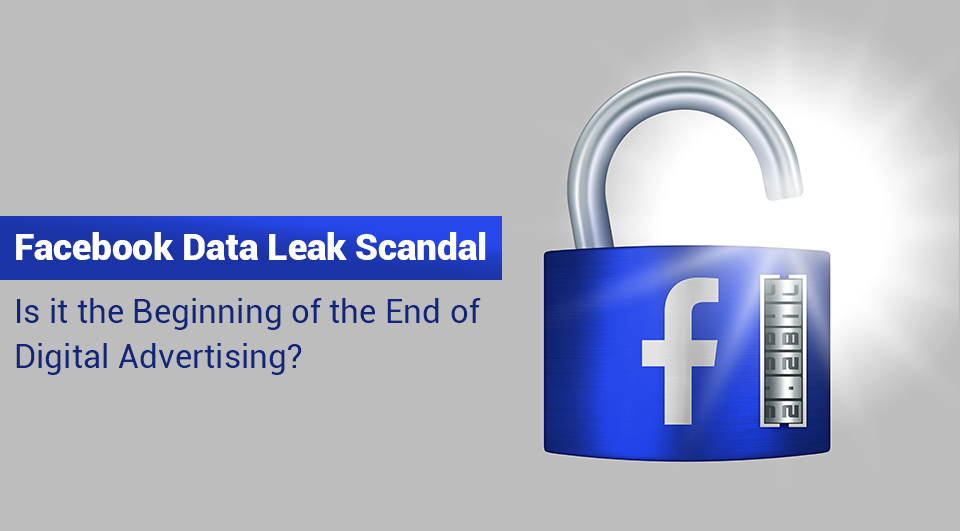Facebook Data Leak Scandal – Is it the Beginning of the End of Digital Advertising?
The recently concluded Facebook-Cambridge Analytica scandal revealed that the personal data of as many as 87 million Facebook users may have been exposed for commercial misuse by advertisers to influence the 2016 US elections.
A lot of news reports are making the rounds since the scandal broke. Their assessment of the situation suggest that after the data privacy scandal, Facebook’s stock prices might be hit badly. Online propaganda campaigns such as #DeleteFacebook are also making rounds in public space.
For short period advertisers may even curtail spending as acknowledged by Sheryl Sandberg, Facebook’s COO.
The turmoil of this incident finally resulted in Mr. Zuckerberg’s testimony to the congressional committee accepting the mistake and confirming that his company is now committed to exhibit a broader sense of responsibility to safeguard personal information of its users and prevent it from any possible misuse by a third party.
So where does all this lead to. Wil it result in some kind of a trust deficit between billions of customers and the brands that rely on Facebook for personal aggrandisement?
All said and done, my guess is that there will be no significant increase in Facebook users deactivating their accounts. Hating Facebook won’t stop them from using it.
Why? Because users and advertisers alike today have not only become addicts of the medium but in fact a whole digital economy is based on its revenue model. There is an entire industry of digital advertisers depending heavily on not just Facebook data but also data aggregated by other tech giants such as Google for survival of their business.
As a matter of fact, sources expect the total spending on digital advertising to reach nearly 93.5 billion U.S. dollars by 2020. And, Google and Facebook dominate the US digital ad market.
According to eMarketer’s digital ad spending forecast, the digital ad ecosystem’s so-called duopoly was expected to rake in a combined 63.1% of US digital ad investment in 2017.
But the cascading effect of the Facebook fiasco will accelerate regulatory framework for dealing with data privacy issues more strongly. The initial struggle to restore faith among social media users is already in progress.
As per reports online, “Social media networks today now connect more than 3 billion users worldwide.” The growth and penetration of social media has made profound changes in the social and cultural milieu of the world. Progress in AI technology (Artificial Intelligence) is going to further deepen intrusion of this network in human lives.
If we are to believe Mr. Zuckerberg after the recent debacle, Facebook is now committed to spearhead a full audit of their systems so they can put in place better architecture to restrict data access by third parties, crack down on intrusions of foreign operatives into their system, rework algorithms to offer more secured engagement, and update service disclosures for general public to decipher easily.
What has made social media so vulnerable and also so special at the same time? Special, because it has empowered common voices to be heard, and vulnerable, because the same voices are so overexposed in the system that they can be easily misled by vested interest groups for commercial and social misuse.
From here on, Facebook’s commitment to bring people socially closer will largely depend on its ability to work with greater social responsibility.
Let there be no doubt that the catastrophic failure is also a wake-up call for tech industry as a whole. Although popularity of social media will not decline but users will increasingly become more vigilant in connecting to and from digital networks. Users across the social boards could reduce engagement to safeguard privacy and prioritize meaningful connection over casual networking.
So, is it really the beginning of the end of Digital Advertising?
Certainly not, but the recent episode and its effect will surely set the context and the background right for the digital advertising industry to re-consider its broader responsibility in ensuring consumer protection.
Let’s face it, Facebook isn’t going anywhere.
It’s so deep rooted in our lives now that it is difficult to imagine life without it. It has also become an integral component of how brands today leverage web space to reach out to their target market. The present situation may be a bit challenging for businesses that advertise heavily on Facebook and its likes. But things will hopefully improve after some course correction. As these much needed changes unfold, brands that engage with their audience unequivocally and with greater clarity will resonate and find acceptance among its users. Remaining others will be either forced to follow suit or will be left behind to perish.




